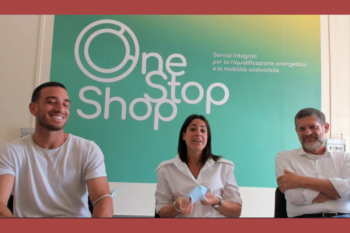Energy community: each group has a different way to look at it.
Interview with public and civil activists in the Metropolitan Area of Naples


Today we’re in the South of Italy: in the region of Naples, four small municipalities team up for the energy transition so as to make their place attractive for current and future generations. UCSA, which is the official name of this group of municipalities (61.000 inhabitants), puts special emphasis on citizen-led initiatives. That is why they came to the ECF collaboration lab with representatives from local non-profit organisations focusing on social and environmental questions. In this episode, we talked to 3 people who are very much pushing for collaborative actions between the 4 cities and civil society: Vittorio Cammarota and Clementina Palma represent the active youth while Luigi Acquaviva brings in the city perspective. He is the president of UCSA. Beyond the first objective of raising awareness and improving energy efficiency, the group aims for collective energy generation.
The interview was recorded over the internet. Unfortunately, there was a sound problem during recording and we had to shorten the conversation. Due to the poor audio quality, we recommend you to read the interview transcript while listening to it. Thanks for your understanding.
Energy
Cities: Buongiorno to all of you! Welcome to our Cities Stories podcast.
I’m really happy that you’re there, the three of you. Can you quickly present
yourself? Tell me who you are, and for which organization you work.
Luigi: My name is Luigi Acquaviva. I work for the Ufficio Comune per la Sostenibilità Ambientale which is a coordination and planning office for energy, climate and environment in the South of Italy, specifically near the Metropolitan city of Naples. And it works for four municipalities.
Clementina: Good morning. My name is Clementina Palma and I am 27 years old. Here I represent the Forum Dei Giovani of [the municipality of] San Giuseppe Vesuviano that is participation organism that brings young people closer to public institutions through social and environmental activities.
Energy Cities: Ok, so you represent the youth. And what about you Vittorio?
Vittorio: Hi. It is a pleasure to be here today. I am Vittorio Cammarota, I am 24 and I’m representing Palma Sociale, an association that encourages youth aggregation and organises events for the social minorities. And, as I said, the youth aggregation.
Energy Cities: So it’s great: We have a city representative and then this youth and socio-economic part, which is really important to push energy communities further. And can you just say a few words, Luigi, around the four municipalities that you’re representing?
Luigi: Yes. As I said, we are in the Metropolitan city of Naples, in the South of Italy. The four municipalities reach jointly a population of 61.000 people. We work since 2015 in the area of environment, climate and energy. The idea was to create a strategic planning office that was helping the municipalities to work alongside Europe on such themes. It was sort of a reaction to the COP in Paris in 2015. The important thing to mention is, that we are in a very unique situation, because the city council finances our activities. And, later, we started also relating the action that this strategic planning may produce like in the case of SECAPs – so our sustainable energy and climate action plans.
Energy Cities: Hm, and so you thought it’s probably easier to involve other associations and the local stakeholders and not to do it on your own. You’re a group of quite different partners. And during the Collaboration Lab, you were even more people involved. So you represent a number of different organizations which synergies or contributions does each of you bring in to push the energy transition and the implementation of the SECAP objectives that you set?
Luigi: Well, as I said, I mean, the approach that we did was to move forward from only making plans to get the proper stakeholder involvement. We defined two targets: the first one was youth. For two reasons: the first one, which is obvious, which is the fact that they are going to be the ones living with this decision, with the effect this has. And the other is that, currently, youth has a great capacity to penetrate a community, because they belong to families in the community, they are friends of families of the community. So, they are the easiest way to reach a community and to try to get them involved.
Energy Cities: Can you explain a bit how you, as this youth organization, are involved in the different activities that are driven, or at least initiated by the municipalities? What type of joint projects do you have?
Vittorio: In my case, like Palma Sociale, we encourage the young generation, so that they can increase their sustainable mentality and protect the environment. With the municipality we are currently working and we are organising events for, as I said, encouraging the aggregation of youth. So that we can spread this new type of mentality.
Energy Cities: Ok, so it’s essentially awareness-raising and making sure, that the society really understands and has the same priorities as you have, right?
On a scale from 1 to 10, for example, how aware and engaged our citizens already in your area, when it comes to energy generation, renewable generation. Or is it something, that people are already really keen on doing or do you still need to promote it a lot and make sure, that you get people engaged on the topic?
Clementina: So, on a scale from 1 to 10 we are at 1. But the fact, that we are here, shows that we are more interested to have a sustainable world and less poverty. And we are more informed about these topics.
Vittorio: I think, as we are the new generation, of course, with all the social media stuff, we can be more informed and also very quickly informed about other stuff and also about the environment. That’s the good point for us, but the mentality needs to be changed a lot more. But we are trying.
Energy Cities: It’s good that you’re you’re already trying this. Luigi?
Luigi: Yeah, I was going to add that when we were trying to move the community on this idea of energy community, it was much easier with youth than even with the business community, while they would have benefitted from incentives. But that was not enough for them. For the youth or the associations of youth we met, for them it was almost immediate. Their community was more important than the single benefit that somebody can take away.
Energy Cities: Ok, so youth was immediately very open-minded to those very innovative questions, compared to businesses who have their business to do. And anything new is probably all too confusing. But I hope you will also manage to involve businesses. What about this energy community that you have planned to set up? How will you go about that? What is your plan, Luigi? I guess you’re the best placed to talk about the project. I mean, will you choose public roofs, and people can can invest in the solar, which will be installed on it? Or can people provide their own solar roofs? Or is it only at the stage of awareness-raising for the time being?
Luigi: We are in sort of a second step. The first thing that we did, was to start introducing the thematic with the community. And we got different types of interest or levels of understanding. Then, of course, we separated the groups according to the level of interest, but also to the level of knowledge. We have a a different approach from the way that we are working with youth compared to one with private individuals of a condominium or with businesses. Because each one of them has a really different way to look at it. So, that’s what we did already. Now we are building on this first step of identifying who are a potential target to create the community. Of course, in parallel, we also worked jointly with you and other cities to arrive to a project which is POWER UP. That is also financed by the EU where energy communities are used to alleviate energy poverty. So, we are at the point, where we need to merge the work, that we have done with the project so that all this becomes one.
Energy Cities: And a question to the young people: what if you could dream of how your city looks like in 5 or 10 years, and especially in terms of renewables, how would you imagine your city by then?
Vittorio: I think like from now to 10 years, a lot has to change. From my point of view, I hope that we can become more a city like Prague, because we had the chance to work with them and with you, too. And so, we have to be more like them. The institutions have to change their mentality and be more open-minded to allow more things. Also, I think here we have a small reality, but we can do very much. So, I hope that from now to 10 years we can see a change, that we can all be proud of. And…that’s it.
Energy Cities Last year, we welcomed Claudia from the Energy Agency of Modena, and Sarah from the Italian co-operative Enostra during our ECF collaboration lab. And they both said, well, they talked about the difficulties and the obstacles that still remained when you want to set up an energy community. And they talked about the Italian law which still requires co-operative members to be within the same transformation cabin, which makes it very difficult to actually have a big group of different people because it’s just people who are living very close to each other. Is that still the case or has something changed? Has the transposition of the law been a bit more effective since last year?
Luigi:! Well, in reality, that’s our main problem still. Because, what was done last year, as you already mentioned: the law still has this provision with the transformation cabin as the reference for any energy community. But also, they link the incentives to promote the first community also to this type of provision. That means that very few examples have come into place up to now. In addition, some regions, like in our case, have put in their law the provision for energy communities, but still, have delayed the way that energy communities can be or cannot be operated in the region. It does not accept the law as it is at national level. But they say, they will go further and detail how to do it. That means that to create now an energy community in Campania, in my region, will be a risk that the lower provision, when the law will come, may say that this type of situation may not be in line with the law. So what we are doing: we are creating simulations. So we are simulating the possible solution when this law comes out next.
Energy Cities: Ok, so, it’s still, it’s still a bit difficult and you need to be creative to still manage to have your energy community.
I will already ask you the last question of the interview: you participated in this collaboration lab, that we organized. And thanks to the European Climate Foundation there, you met other cities. There were Valencia and Prague with us. What are your main take-aways?
Luigi: Well, I will start with that. As Vittorio mentioned, our situation is quite different, because we are a smaller city compared to Prague and Valencia. What was very interesting is that, on one side, like in the case of Prague, the whole system is more structured – so there is a big system in place that can support immediately the process. As to Valencia, it has more worked with the community, in this sense, by creating an office, facilitating the spread of information or of communication on this project. So, they have a different approach, but both of them are significant for us, because it’s part of what we need to do. But as I said beforehand, I mean, currently, the work that we have done was really trying to make people aware that there is a great potential of using renewable with energy community rather than using renewables only for one’s own single benefit. So there is a high benefit of sharing the production from the cumulated energy.
Energy Cities: It seems to me that you use the, this opportunity of energy communities, rather as of a vehicle, to improve many other things in your place. And to really work with people. So, that in social, economic, environmental terms, there are things that change. And I think that’s a good way, because renewable energy as such is probably not the single objective, but there are so many co-benefits coming with it. That it makes sense to have this broader picture that you have.
Luigi: I just want to add – and then give time to them – that we just finished, in the first part of June, to work with the same group and also with some businesses and more structured associations at national level. So, in this moment, the work that we plan, shared with the community – the activity on energy community – has opened up new doors to other issues that we need to tackle. So, with that, it became easier with the community to create or to activate other processes at the same time.
Vittorio: For me, personally, I agree with Luigi. We are grateful for the opportunity that we had to work with you or with Prague and Valencia and we are taking the ideas from you and we have to work and to do all the things. So, we are happy to be part of this project.
Clementina: Also from my side, for me, after the collaboration lab, we were enthusiastic and also for me we are thankful for the possibility to participate. And, we hope, we do have the possibility to learn more.
Vittorio: You are showing us the path. So we have to follow it now.
Energy Cities: Excellent. That’s a nice conclusion, and I really wish you a good walk. You have lots of energy. So use this positive energy for implementing all the ideas that you have. And I think it’s amazing how you do that with so many different partners. And I think it’s a great opportunity. And as you say, Luigi, you do one step and there are so many new other paths that can be opened in front of you because you will just discover the landscape with each step that you do.
So, thanks a lot to the three of you for your time today and good luck with the remaining work. And let’s meet, the latest, in 10 years, so that we can check where you’re at with the different ideas and projects. Thanks.
Clementina, Vittorio, Luigi: Ciao. Thanks!
This episode and the collaboration lab were made possible thanks to funding from the European Climate Foundation (ECF). The ECF is an international non-profit and its great team promotes climate and energy policies in Europe. In 2019, the European Climate Foundation launched its Energy Democracy program. It focuses on the support of community energy projects both at the EU and national levels. europeanclimate.org





